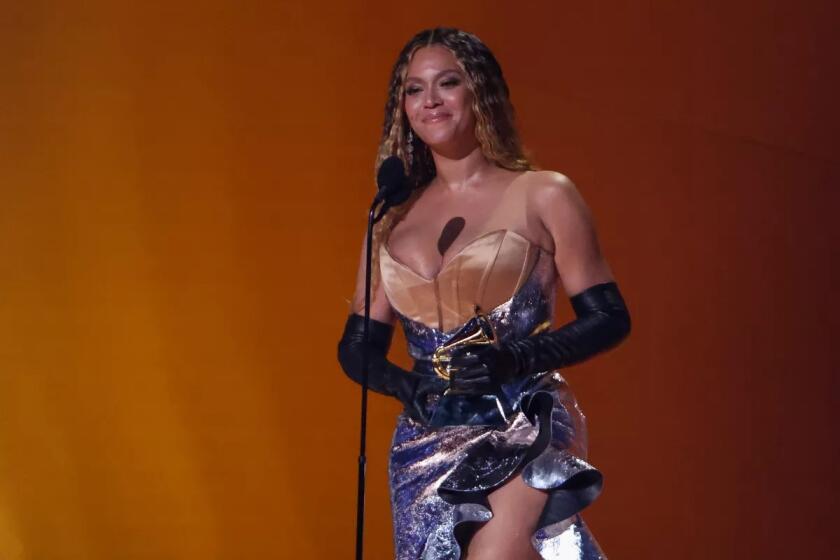Sounds Like a Long-Term Plan
- Share via
James Diener is almost certainly the only head of a music label whos readingfor pleasurethe worlds hundred best books. Right now, hes slogging through Theodore Dreisers Sister Carrie, a novel thats a century and a universe removed from his world. But Dieners reality as CEO and president of A&M/Octone Records is far from whatever passes for normal in todays music business. For one thing, A&M/Octone is small. Two pizzas could feed its New York-based staff. Nine years after its launch as Octone Records, it still has fewer than 15 acts under contract. And yet every move Diener makes is designed to produce long-term careersand blockbusters.
He came slowly to the idea of a little company with big dreams. His father, Steve Diener, was president of ABC Records in the late 1970s. At his New York private school and in college, Diener played in pickup bands, then cover groups and bar bands. But he was also an honors graduate of Johns Hopkins, and it didnt take the fledgling record exec long to realize his company was ripe for a new business model.
At Columbia Records and then RCA Music Group, he achieved a rare double title: vice president (senior at RCA) of both A&R and marketing. But he felt conflicted, because while established artists got world-class promotion, new ones were orphans. We signed a lot of acts that didnt get a decent shot, he says. I wanted to change that. So he started an independent label to nurture bands until theyd sold, say, 100,000 CDs then upstream them to a major label for the push to millions.
In 2000, with several partners and handpicked investors, Diener made a deal with Sony BMG while continuing to work creatively with Octones acts after they moved to the big leagues.The double tracking paid offhe enjoyed major success with Maroon 5 and Flyleaf; Octone moved on to A&M; and Diener, now 39, is struggling to find time to read.
Jesse Kornbluth: You had a fantastic job at Columbia. Why launch a start-up?
James Diener: Great record execs are known for the careers they develop.
JK: Did you tell investors youd have a band tour for 18 months before recording?
JD: I told them, and they understood. Theyre individuals who love music and recognize patience equals success.
JK: Youve said the hardest job for a company is getting the first 100,000 sales. Why turn a band over to a major label to get to the next level?
JD: We never turn a band overwe add partners to increase support and scale. Scaling is what the majors do best. They still have an essential structure if youre aiming for worldwide success.
JK: All of the majors passed on Maroon 5. What did you see that others didnt?
JD: A tween band that didnt fit a format. Maroon 5 was a white rock band doing pop music, with a singer who has a compelling, urban-style voicethe band was progressive but commercial.
JK: Where did this tween notion start?
JD: I grew up listening to pop, rock, jazz, fusion and classic soulnot compartmentalized music. I continue to believe that kids will listen to music outside narrow borders. And when tween artists connect, theyre stickythey tend to become career artists.
JK: Maroon 5 worked out rather well for you: 14 million albums sold.
JD: And none of their first three hit singles had been written when we signed them.
JK: In The Long Tail, Chris Anderson wrote, Increasingly, the mass market is turning into a mass of niches. So why aim for blockbusters? Why not control costs and produce niche acts?
JD: I respect the long tail. But blockbuster artists are essential.
JK: The current meme has it that bands can no longer expect to make money on CD salesthat the cash cow is touring. Small glitch: In 2008, the big winnersMadonna, Springsteen, Bon Joviwere acts that have been around for decades.
JD: Thats why we prefer diversified revenue: CDs, publishing, tours, merchandise. Aerosmith had no idea something called Guitar Hero would come along and make them a second fortune.
JK: Are you out every night listening to new bands?
JD: Mostly I stay home, listening online and checking out new bands on social-networking sites.
JK: Just how awful is file sharing?
JD: Its a big factor. Once you get music for free, how can we convince you to pay for it?
JK: Didnt I read that Napster increased CD sales?
JD: For every study, theres a competing study.
JK: Do you turn down artists?
JD: When we see short-term hits coming but dont see careers.
JK: What do you tell artists when you take them on?
JD: Youll win on a split decision in the 15th round, not necessarily by a knockout in the first. Its a war of attrition. It took Maroon 5 four years to reach its full audience. In an industry of sprinters, we run marathons.
JK: Will traditional labels still be around in 5 or 10 years?
JD: The rate of change in the entertainment industryand especially in musicis unlike anything weve ever faced. Many of the traditional intermediaries may disappear. I assure you: Evolve or perish is always on our minds. But at its essence, what we do is artist development. We believe in enduring talent. And if we do it correctly, however the industry morphs next, the demand for our artists will ultimately be there.
More to Read
The biggest entertainment stories
Get our big stories about Hollywood, film, television, music, arts, culture and more right in your inbox as soon as they publish.
You may occasionally receive promotional content from the Los Angeles Times.









